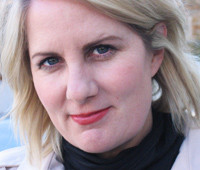Mysteries
Jennifer Moxley in conversation with Noah Eli Gordon

In early 2008, Noah Eli Gordon interviewed Jennifer Moxley. The interview was originally published in The Denver Quarterly (Volume 43, Number 1:2008), and reprinted in Jacket magazine number 37. It is 17 pages long.
Noah Eli Gordon: 2007 saw the release of two major works: The Middle Room, a memoir clocking in at over 600 pages, and The Line, a collection of prose poems. Although publication dates often create a false trajectory of a writer’s past and present concerns, when read in tandem, these two very different prose works seem to share not only various emotional and intellectual concerns, but also specific content. For example, early on in The Middle Room you recount the discovery in the garage of “an enormous stack of love letters” written by your father and addressed to your mother, which gave you a fuller sense of him as a person outside of your own experience. This particular passage took on a renewed significance for me while reading in The Line the poem “The Cover-Up,” where you include the following: “On occasion, material evidence contradicts memory. Like when you found the letters they’d written in which he’d said affectionate things and all of her years of negative campaigning went completely down the drain.” Whether or not this is a reference to that same discovery, the poem created a link for me between your various projects.
[The complete interview]
Noah Eli Gordon: With the poem’s question “are these records of events your senses stored without your knowledge?” this link was further complicated, as it sent me back to the title poem from your earlier book The Sense Record, where “[t]he gray of an old folded paper / decomposed on the nearby walk,” leads to “[t]he heartfelt story of engagement / recast as sucker bet, who licked the stamps, / who walked the streets, the earnest underlings, / forestall the mockery in memoirs, / two-to-three hundred ‘as told to’ pages / to set the record straight.” Again, this might not be a reference to the that same incident, but it does carry similar concerns as regards the complexity and conundrums of what, exactly, constitutes truth in writing, and of how documentation can alter that regard. In fact, the poem includes these lines which I read as looming large over much of your work: “What I write in truth today / tomorrow will be in error.” You also mention the necessity of truth in The Middle Room, with the admission that you “could not adopt a literary style for the sake of a mere idea unless [you yourself] had experienced that same idea as true.”
My first question then is one of truth. How do you conceptualize the role of truth in your work? How is (or isn’t) such a role altered when moving between genres? Is The Middle Room, as a memoir, any more beholden to truth than the poems of The Line? Is truth in a poem different than other kinds of truth? Does a writer have an ethical responsibility to truth? Where do truth and imagination intersect for you?
Jennifer Moxley: Well, in some way, your line-up of quotes from my work answers your own question. Truth in my work is just that: a question. The story about the letters records how material evidence contradicts personal legend. This was my experience in writing The Middle Room. Rae Armantrout asked me, “How did you remember so much?” I didn’t just sit down one day and it all came pouring out. I did research: journals, letters, checkbook registers, photographs. Often the evidence contradicted my memory, the question of honoring both the material record and my memory then became one of artfulness. But “The Sense Record” is suspicious even of material evidence, because, again, the body and mind have their own archive apart from made things. I do not believe that we have experiences and then remember them rightly or wrongly. The Proustian model is preferable. The present unfolds unexpectedly in the future, the past holds the present hostage and shapes it.
I’ve always disliked the way the contemporary intellectual discourse sets itself above the past as “knowing better,” claiming to see truths the past was blind to. Poetry has a duty to pressure conviction. I suppose that is a form of being “beholden to truth,” as you put it.
As for genre, sometimes I joke with my fiction writer friends that the difference between myself and them is that they make an art out of lying. But that’s obnoxious. Fiction can tell great truths, and should, as should poetry.
[The complete interview]
Under the horizon